British enterprises have secured a significant victory with the UK government successfully negotiating a two-year extension on rules of origin with South Korea. These extended trade rules are economic boons, allowing British businesses to maintain reduced or eliminated tariffs on goods exported to South Korea, under their existing free trade agreement. It’s a strategic relief for importers and exporters, providing a cushion against hefty tariffs, thereby facilitating smoother trade operations between the two nations.
For the imminent future, a refreshed chapter of trade negotiations is set to unfold. Plans are afoot to craft a modernized trade agreement that aligns seamlessly with evolving sectoral needs, notably incorporating significant focuses such as the digital sector. The initiation of these groundbreaking negotiations is anticipated before the close of the year.
South Korea, an economic powerhouse standing as the world’s 13th-largest economy, displays promising signs of rapid growth and expansion. Driven by a thriving middle class, the import market of South Korea is on an optimistic trajectory, projected to inflate by a remarkable 45% by 2035. The UK has experienced a flourish in its trading relationship with South Korea, witnessing a substantive doubling in trade volumes since the establishment of the original Free Trade Agreement (FTA).

Last year bore witness to an impressive exportation of goods worth £7.3 billion by British businesses. With the newly secured extension, a multitude of sectors including automotive and food and drink, are poised to harness substantial benefits, allowing them to navigate the market with enhanced agility and foresight.
Minister for International Trade, Nigel Huddleston, expressed enthusiastic sentiments, labeling the development as spectacular news for British businesses. The extension is a gateway for UK businesses, enabling them to maneuver through the South Korean market with fortified confidence, capitalizing on its strong demand for quality British products.
Key industry figures such as Mike Hawes from the Society of Motor Manufacturers and Traders and Balwinder Dhoot from the Food and Drink Federation, have expressed their commendation for the extension. Their reflections emphasize the strategic importance of the development, underscoring its role as a crucial facilitator of continuous and enhanced trade relations.

A well-choreographed sequence of negotiations awaits initiation, carefully designed to encapsulate the priorities and strategic objectives of diverse business sectors. The upcoming trade deal is tailored to be a beacon of modern relevance, focusing on nurturing digital innovation and offering pivotal support mechanisms for small and medium enterprises, propelling them towards pathways of success and sustainable growth.
IMEX SECTOR | Russia, China Unite in Japan Seafood Ban: Geopolitics or Genuine Health Concern?



